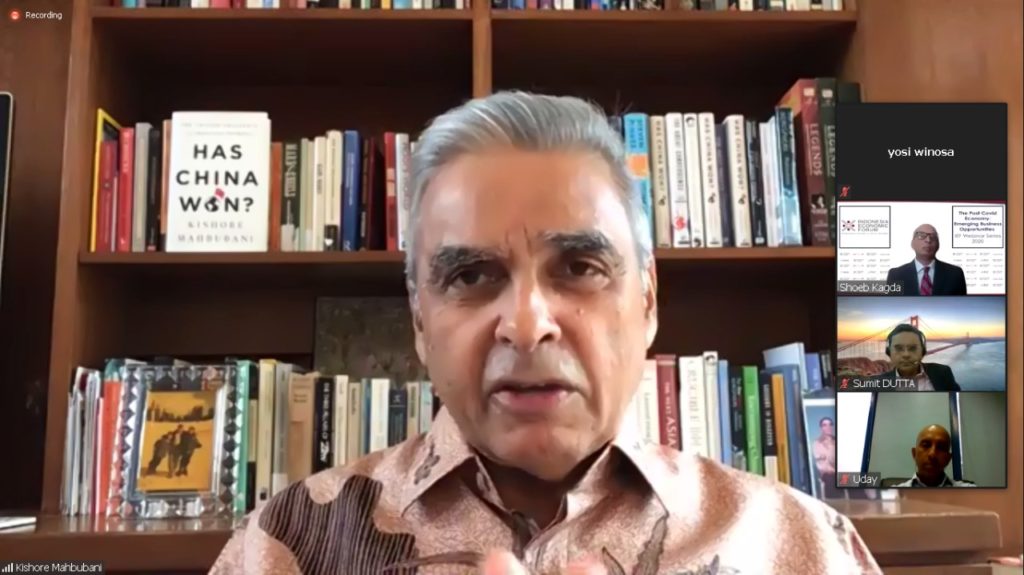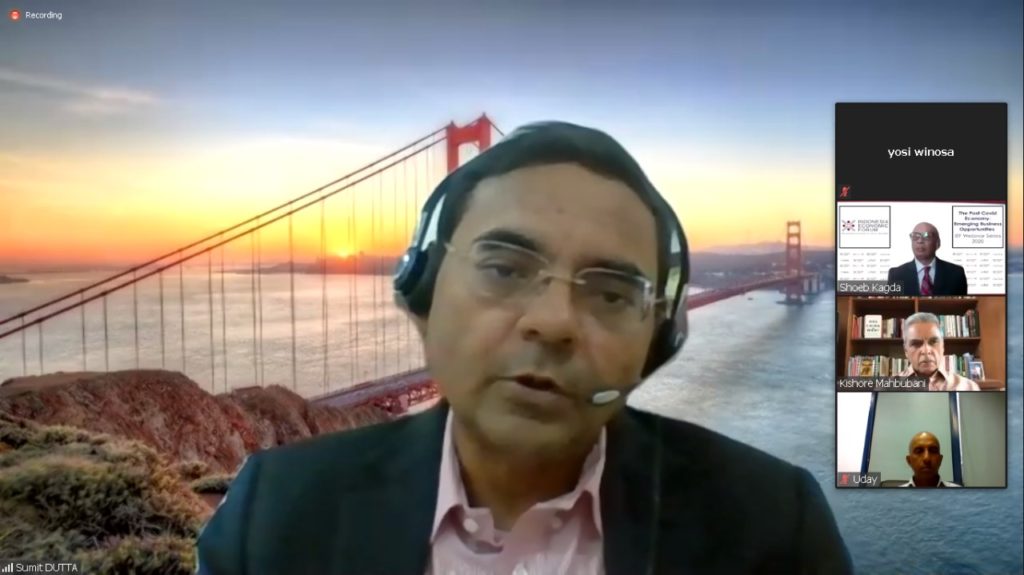Indonesia Economic Forum in collaboration with Synthesis Communications, Orbit Future Academy and Chairos International Ventures presented the Webinar Series titled “After Covid 19: Growth or Depression?” with Prof. Kishore Mahbubani, Senior Fellow at the Asia Research Institute and former diplomat and Dean of the Lee Kuan Yew School of Public Policy, National University of Singapore as keynote speaker and Sumit Dutta, President Director PT Bank HSBC Indonesia. The webinar was moderated by Shoeb Kagda, Founder and CEO Indonesia Economic Forum.
The speakers shared their insights on how the Covid-19 pandemic has impacted a new world order and the emerging trade patterns in Asia against the backdrop of the ongoing economic war between the United States of America and China.
“We are now living in a new reality. Covid-19 and the ensuing global economic crisis that it spawned has disrupted and uprooted millions of lives; destroyed thousands of companies and upended entire industries. There is no political leader in the world that has not bee affected by the pandemic,” noted Shoeb Kagda in his opening comments.
The Covid-19 pandemic comes against the backdrop of growing tensions between the US and China as what started as a trade war has morphed into an all out economic and political confrontation, he added. “The fall out from this clash is likely to have long term ramifications for all countries.”
In his presentation, Prof. Kishore Mahbubani noted that the winner of the China – US economic war could be determined in the post Covid-19 era. The pandemic has deeply affected both countries’ economies and structural conditions given their high interdependency and as a result they are unlikely to decouple anytime soon.

“To understand which is country is more powerful than the other, the proverb ‘the enemy of my enemy is my friend’, is relevant. In this case, Covid-19 could be a determinant factor. The country that can better handle the pandemic will eventually emerge the winner. And as what I’ve learnt from geo-political rule over the last 2,000 years is that once an emerging power passes an established power, it will push aside the defeated power.”
This is a zero sum game, where the winner takes it all. For instance, if Asian countries finally choose 5G technology from Huawei, Beijing will automatically replace Washington DC in the role as preferred trade partner for Asian nations.
On the situation in the South China Sea, Prof. Mahbubani noted that the conflict in the region has added to the geo-political uncertainty for many Asian nations. He said that the US has long engaged in conflict with China in the South China Sea but now other nations such as Vietnam, the Philippines, Brunei Darussalam and Malaysia as well as Indonesia have also joined the fray.
“It’s interesting to see, will South East Asian countries work hand in hand to fight China over territorial claims? Will the US take the side to South East Asian countries and ally to fight China?” he observed.
On the issue of the unfolding situation in Hong Kong, he said that it is very clear that US will find any opportunity to embarrass China and vice versa. So clearly the trouble in Hong Kong has been a boon for the US and it is perfectly natural behavior when the US uses Hong Kong as a reason to embarrass the Chinese government. But in the process, Hong Kong is becoming a political football, and it’s important for people in Hong Kong to be aware that in the larger picture, they are the ones who will suffer.
“I think it’s important for the people in Hong Kong to realize that is the case. The West’s long-term interest in Hong Kong is not to undermine it because at the end of the day when companies are looking at their P&L, they cannot ignore the Chinese market. When you want to play in the Chinese market the best way to do so is still to go through Hong Kong and that why it is actually in the Western business establishment’s interest to tell their governments to slowdown this bashing of Hong Kong. In the end they still need Hong Kong so I hope eventually Hong Kong will settle down,” Prof. Kishore Mahbubani said.
Meanwhile, Sumit Dutta stressed that there was already a shift in investment trends pre Covid-19 as manufacturing activities in developing countries. Over the past seven years, there have been a tremendous capital flows out of China, Japan, Korea and the US into developing economies including Indonesia.
These countries have deep pockets and are comfortable with large capital investments. China through its Belt and Road initiative is also investing heavily in Asian and African countries. Such developments present a huge opportunity for countries such as Indonesia to attract new investments.

“In the post Covid-19 era, nationalism and the anti-globalization movement will accelerate in many markets including the US with its slogan ‘Make US Great Again’. But from the business perspective, corporates will continue to run on rationale business sense, that is to seek revenue, seek new potential markets especially when the existing markets are saturated, and also move their production bases to any country with the lowest production cost,” Mr Dutta added.
At the moments corporates are applying a China plus one business strategy, which means to a seek new production equilibrium, and seek opportunities in other Asian countries such as South East Asia including Indonesia as new production bases.
Indonesia, however, has not attracted such investments, which have flowed to Vietnam and the Philippines, largely due to complex regulatory environment. “There is real effort by the government to improve this issue by finalizing the Omnibus Bill and improve the investment climate in the country.”
“The question however is does Indonesia really encourage foreign investment activity? On the president level and from Minister Luhut Pandjaitan and Mahendra Siregar, they show real effort. But within the second and third tiers of the bureaucracy this same effort is absent and Indonesia must show to investors that it is ready to be a long term and sustainable investment destination,” said Mr Dutta.

